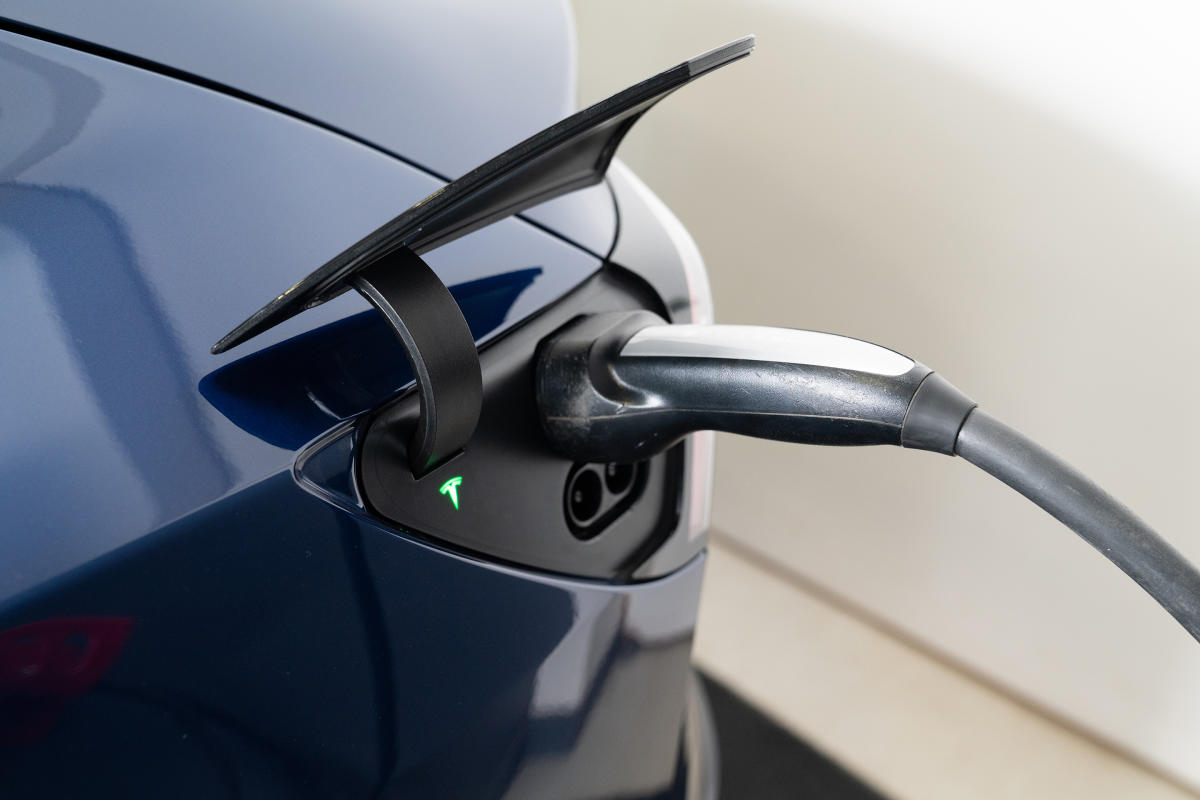Personal Finance
Here Are All the EVs That Qualify for $7,500 Federal Tax Credits in 2023

Only six electric vehicles (EVs) currently still qualify for $7,500 federal tax credits after the government changed eligibility requirements in April.
Fortunately, the list includes some of the best-selling EVs on the market, including select trims of the Tesla Model Y SUV and Model 3 sedan, which were, respectively, the first and second most-sold EVs in 2022.
The relatively affordable Chevrolet Bolt EV/EUV subcompact hatchback, which ranked fifth for sales last year, also qualifies. (General Motors, however, is discounting the Bolt car after the 2023 model year.)
Certain trims of the 2023 Ford F-150 Lightning pickup truck — one of the best-rated vehicles among auto experts — continue to qualify for the full tax credit, as do all eight trims of the Volkswagen ID.4 SUV, which Money just picked as our favorite electric SUV for features. Cadillac’s luxury SUV, the Lyriq, rounds out the list.
Worried about your electric vehicle? Keep it safe with Car Insurance
Getting a free quote is the first step to protecting your investment. Click on your state below to get started.
Get A Free Quote
EV tax credits, explained
More than a dozen vehicles, including several from foreign automakers including BMW, Nissan and Hyundai, became ineligible for the full tax credit when the Treasury Department’s new guidance came out on April 18.
The law governing the tax credits stipulates that vehicles can only qualify if they meet certain battery requirements and pricing thresholds. Additionally, vehicles must be made in North America to qualify for tax credits, which is motivating manufacturers to produce EVs in the continent, according to Cars.com.
Half of the tax credit ($3,750) is contingent on a percentage of an EV’s battery minerals having been extracted or processed in the U.S., “or a U.S. free-trade agreement partner or recycled in North America.” Eligibility for the other half of the credit depends on a percentage of the battery’s components being manufactured and assembled in North America.
From Jan. 1, when the tax credits became available, to April 17, when the party came to an end, the government wasn’t enforcing the battery requirements as it worked to determine which vehicles do and don’t satisfy them.
In the last couple weeks, the list of qualifying vehicles has already changed again, and the group of vehicles that qualify today may look different in a few months. The Volkswagen ID.4, for example, didn’t initially qualify for the tax credit, but the automaker resolved the issue with the government after it secured more documentation from its battery supplier.
In addition to the six vehicles that qualify for $7,500 tax credits, four other models — and an additional Tesla Model 3 trim — qualify for half the credit ($3,750). And in the coming months, three new models will come onto the market that will qualify for $7,500 credits.
Your electric vehicle is an investment — make sure it’s protected
Get the Car Insurance you need without breaking the bank. Click below to get started.
Get A Free Quote
Which EVs qualify for tax credits?
Here are the EVs that can qualify for a $7,500 tax credit:
-
Cadillac LYRIQ, 2023-2024 (MSRP limit: $80,000)
-
Chevrolet Bolt/Bolt EUV, 2022-2023 (MSRP limit: $55,000)
-
Ford F-150 Lighting (Extended Range Battery) + F-150 Lightning (Standard Range Battery), 2022-2023 (MSRP limit: $80,000)
-
Tesla Model 3 Performance, 2022-2023 (MSRP limit: $55,000)
-
Tesla Model Y All-Wheel Drive/Model Y Long Range All-Wheel Drive/Model Y Performance, 2022-2023 (MSRP limit: $80,000)
-
Volkswagen ID.4, 2023 (MSRP limit: $80,000)
-
Chevrolet Blazer, 2024 — available summer 2023 (MSRP limit: $80,000)
-
Chevrolet Equinox, 2024 — available fall 2023 (MSRP limit: $80,000)
-
Chevrolet Silverado, 2024 — available fall 2023 (MSRP limit: $80,000)
These EVs can qualify for a $3,750 tax credit:
-
Ford E-Transit, 2022-2023 (MSRP limit: $80,000)
-
Ford Mustang Mach-E (Extended Range Battery)/Mustang Mach-E (Standard Range Battery), 2022-2023 (MSRP limit: $80,000)
-
Rivian R1S, 2023 (MSRP limit: $80,000)
-
Rivian R1T, 2023 (MSRP limit: $80,000)
-
Tesla Model 3 Standard Range Rear Wheel Drive, 2022-2023 (MSRP limit: $55,000)
Which PHEVs still qualify for tax credits?
Americans who buy certain plug-in hybrids (PHEVs) can also take advantage of tax credits. Two PHEVs qualify for the full credit and four more qualify for a $3,750 credit.
Here are the PHEVs that can qualify for a $7,500 tax credit:
-
Chrysler Pacifica PHEV, 2022-2023 (MSRP limit: $80,000)
-
Lincoln Aviator Grand Touring, 2022-2023 (MSRP limit: $80,000)
These PHEVs can qualify for a $3,750 tax credit:
-
Ford Escape Plug-in Hybrid, 2022-2023 (MSRP limit: $80,000)
-
Jeep Grand Cherokee PHEV 4xe, 2022-2023 (MSRP limit: $80,000)
-
Jeep Wrangler PHEV 4xe, 2022-2023 (MSRP limit: $80,000)
-
Lincoln Corsair Grand Touring, 2022-2023 (MSRP limit: $80,000)
If you purchased a vehicle before April 18 or have questions about tax credits for used EV purchases, more information is available here.
More from Money:
7 Best Car Loan Rates of 2023
The Best Electric Cars of 2023
The Best Electric SUVs of 2023
© Copyright 2023 Money Group, LLC. All Rights Reserved.
This article originally appeared on Money.com and may contain affiliate links for which Money receives compensation. Opinions expressed in this article are the author’s alone, not those of a third-party entity, and have not been reviewed, approved, or otherwise endorsed. Offers may be subject to change without notice. For more information, read Money’s full disclaimer.
Read the full article here

-

 Passive Income7 days ago
Passive Income7 days agoThe One Microsoft Design Tool Business Owners Shouldn’t Miss
-

 Side Hustles5 days ago
Side Hustles5 days agoThe DOJ Reportedly Wants Google to Sell Its Chrome Browser
-

 Side Hustles5 days ago
Side Hustles5 days agoHow to Create a Unique Value Proposition (With Tips & Examples)
-

 Investing6 days ago
Investing6 days agoThis Founder Turned a Hangover Cure into Millions
-

 Investing4 days ago
Investing4 days agoAre You Missing These Hidden Warning Signs When Hiring?
-

 Investing7 days ago
Investing7 days agoYour Firsthand Experiences Shape the Way You Run Your Business — Here’s How Mine Shaped Me
-

 Make Money4 days ago
Make Money4 days ago7 Common Things You Should Never Buy New
-

 Investing4 days ago
Investing4 days agoGoogle faces call from DuckDuckGo for new EU probes into tech rule compliance By Reuters


















